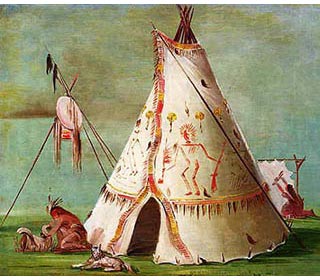The points of the lance were originally made of a hard stone, such as flint, but were replaced by metal points. The points, or blades, of the lance were made similar to spears, only larger in size and somewhat different in shape. The spear was the weapon that eventually developed into the lance. The pictures on this page illustrating the Native American lance provides and indication of the length of this weapon. Native American Lance - The Differences between a Lance and a Spear
The differences between a spear and a lance were their size and their purpose. A Native American spear was easier to manage and used to to strike, thrust, slash or thrown to take down their enemies. The handle of the spear was much shorter than a lance, as were its sharp head or point. The lance was designed for use on horseback and measured from 9 to 14 feet in length. The blades of lances were also generally longer and wider. Native American Lance - Buffalo Hunting
In buffalo hunting the Lance was the preferred weapon on horseback to the bow and arrow. The long, heavy and unwieldy lances took great skill to use effectively together with excellent horsemanship. The Buffalo rider would tuck the lance under his arm and select a buffalo. The buffalo hunter would couch the lance under the arm and charge at the animal. The lance was not used as a spear, in that it was rarely thrown. One jab from a lance would rarely bring down a heavy buffalo, repeated strikes were required to bring the buffalo down. After the initial charge the method was to run alongside the buffalo and jab the long bladed lance into the animal just back of the ribs. The Lance
The Lance required minimal natural resources or technology to construct. The lance was used as a practical weapon of for ceremonial purposes. The ceremonial Lance were decorated with care using carvings or paints to depict special symbols and were often embellished with feathers, horsehair, fringes, beads and often had the fur of a slain buffalo attached. Sometimes this weapon was decorated with scalps taken from victims slain in battles. Ceremonial Lance
The Ceremonial Lance were made as part of the regalia of a warrior. These lances were decorated with symbolic colorings and markings which were significant to the owner. The ceremonial Lances were symbols of power and authority and were sometimes carried into battle as a weapon and for their protective power. The ceremonial Lances were used as the center piece in spiritual dances and were considered status symbols. Making the Lance - The Handles and the Point
Making the Lance was not a difficult task and required just two major elements - the handle and the point: - Making a handle for the Lance: The handle was made using a hard wood or different types of bone or horn including the elk horn. The hardened woods used to make the handle included hickory, juniper, oak, cedar, maple, ash, walnut and birch.
- The size of the handles measured from 9 to 14 feet in length and and 1.5 inches to 2 inches in diameter
- The handle was often covered in deerskin or buffalo skin to prevent lances from sliding backwards in the rider's grip which could cause a broken wrist in the event of a bad strike
- The handles of the ceremonial the Lance were decorated with colored paints and carvings and embellished with feathers, fur and colored paints
- Making the point: The striking end of the lance consisted of projectile points which were made in a number of different shapes from broad leaf-bladed points to long narrow awl spikes. The points were made of stone, bone, antler or metal and fixed to the shaft, called 'hafting'. Tanged points are projectile points that have a tang at one end to facilitate hafting.
|
